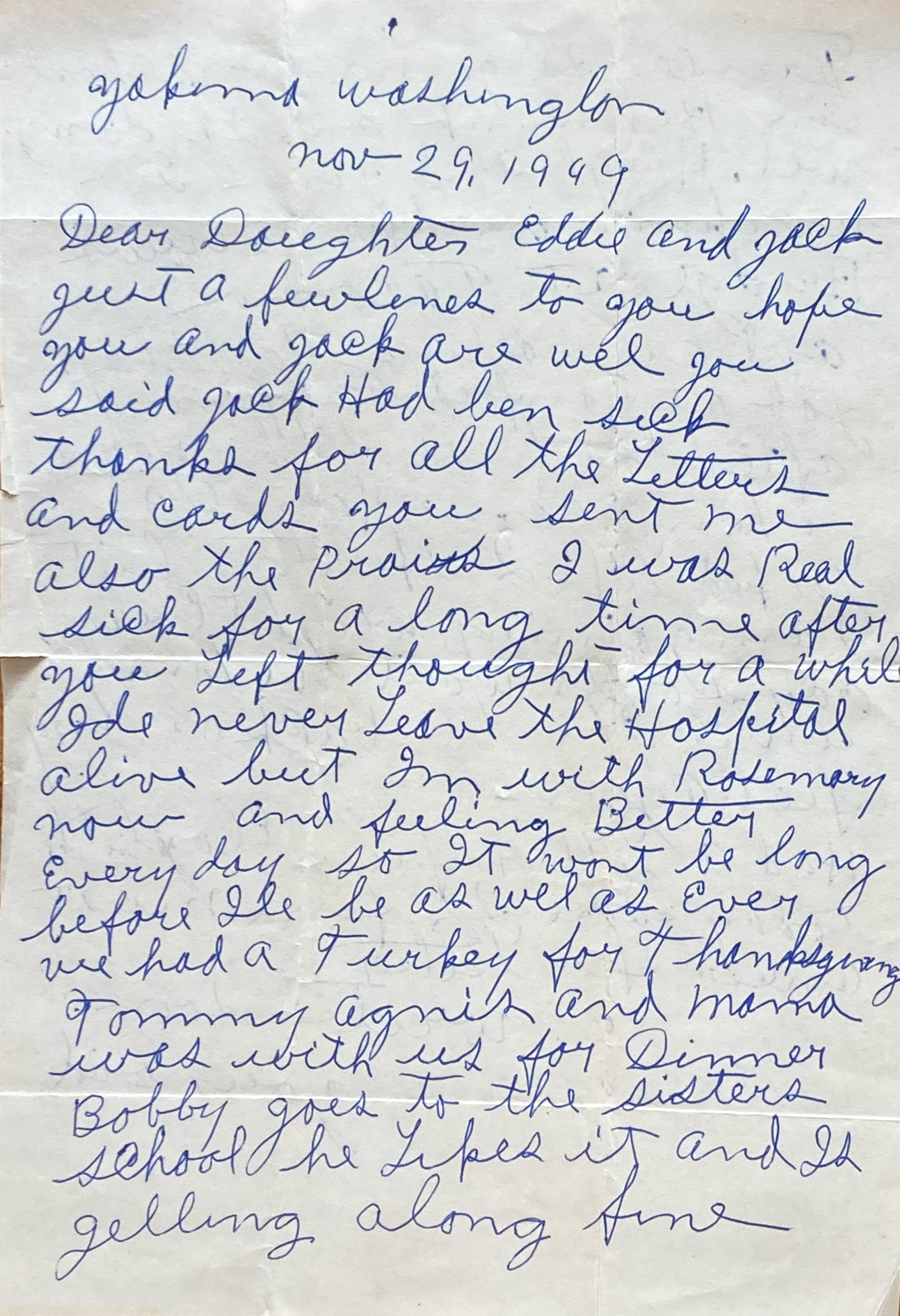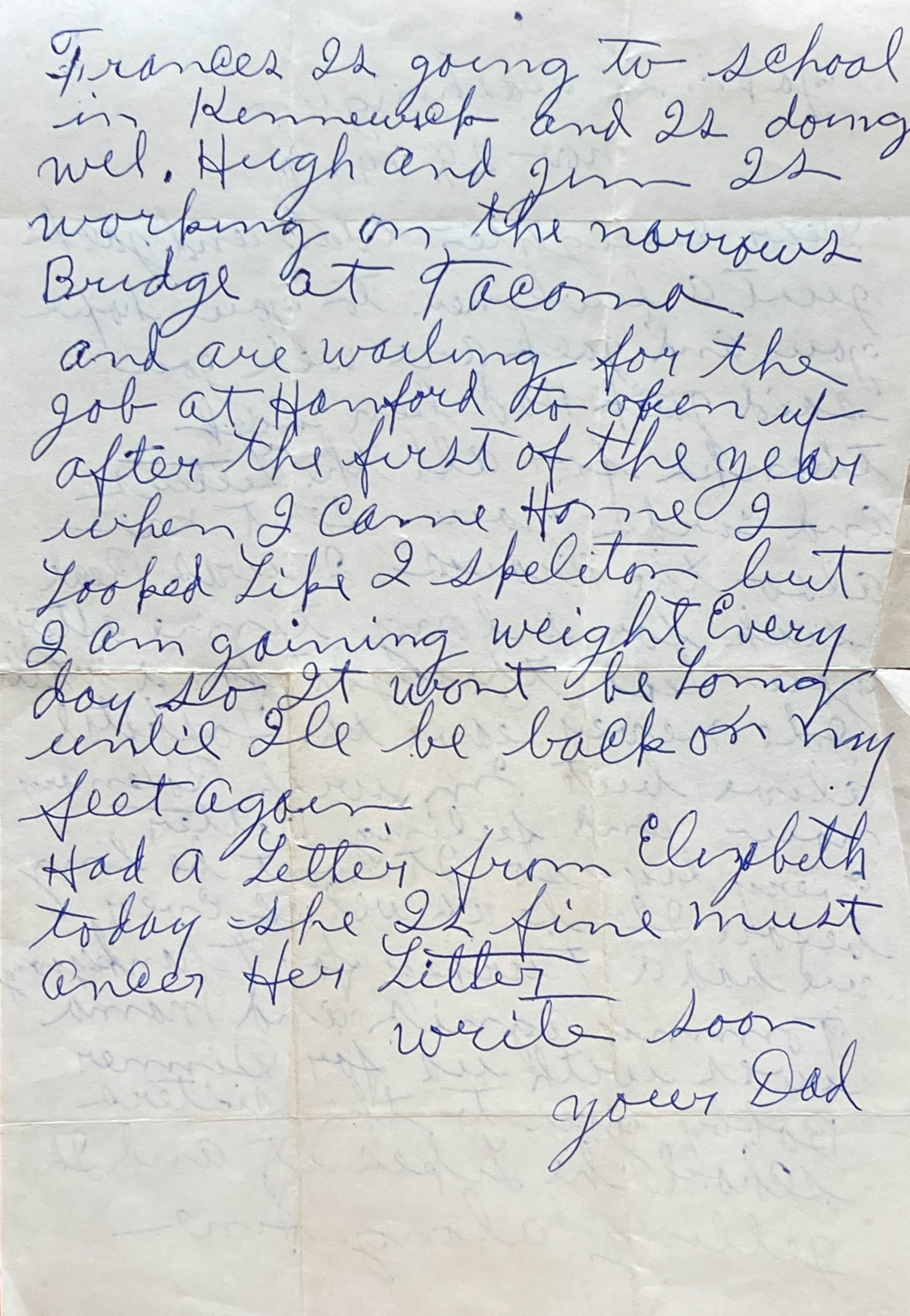The McFadden Farm
by Mike Thompson, 1/9/2012
Mom often used to talk about her childhood years, when she was growing up on a farm in North Dakota. The farm was on Homestead Act land that had been claimed by her parents, Andrew and Ellen (Barrett) McFadden. Each had each claimed a section of land near Crosby, North Dakota before they met one-another and were married. The Homestead Act, which had been enacted by Congress in 1862, encouraged people in the eastern U.S. to move west by promising land to anyone who would farm it and build on it.
The picture below is from Elizabeth (McFadden) MacMillan's scrapbook, and she titled it, "This is Mama's homestead in Crosby, North Dakota. She has a badger on a rope. Her brother Jim is in the buggy and Papa is standing with his hand on his hips between the hay racks."
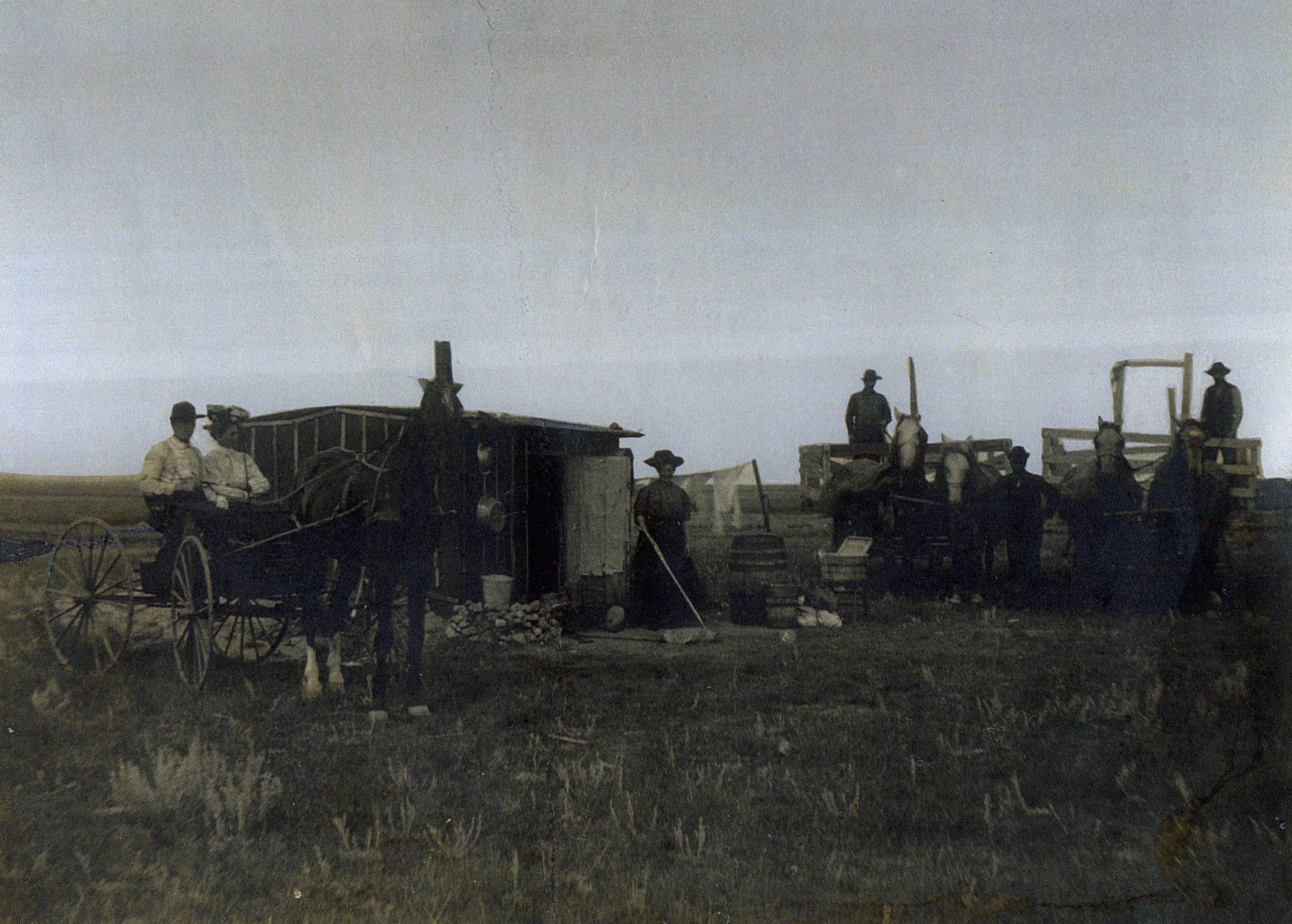
Also from Elizabeth (McFadden) MacMillan's collection is the photo below of Andrew McFadden, my grandfather, and his three brothers. This photo would have been taken in the early 1900s, when the brothers were all living in Minnesota. That's where their father, Hugh McFadden settled after having immigrated to the US from Donegal, Ireland in the 1870s and then worked in the gold mines of California. Clockwise, starting at the top, the brothers are: Dennis, James, Hugh (Jr.), and Andrew (clean shaven, on the left).
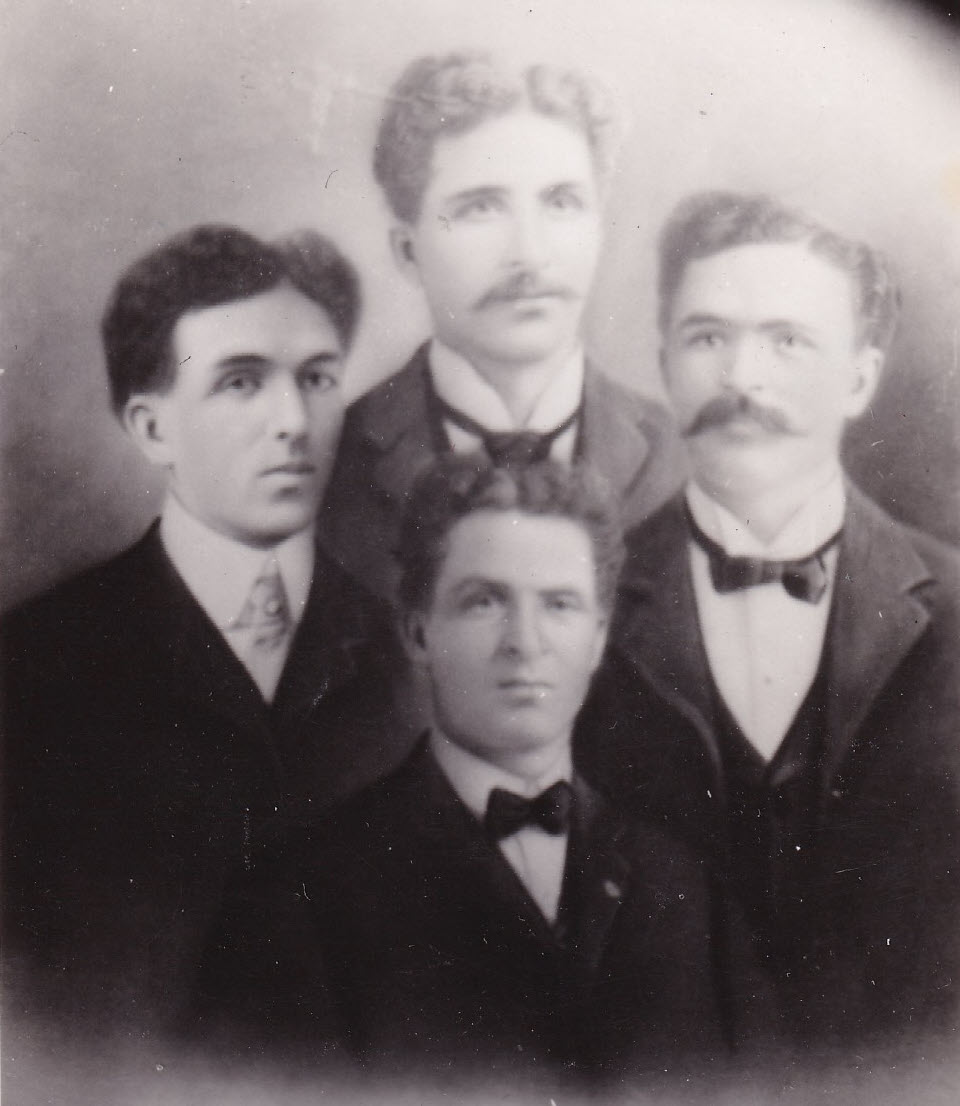
At some point Andrew moved west to North Dakota while his brothers remained behind. One or more of those brothers had a farm in Minnesota, probably inherited from their dad. Their father, Hugh (Sr.) paid at least one visit to North Dakota. I remember my mother, Agnes saying how she listened to her grandfather, Hugh singing in Gaelic, the native language of Ireland. Mom's older sister, Elizabeth returned to Minnesota after she graduated from high school in North Dakota, staying with family members while eventually finding work there with 3M.
Mom was born in 1918, so her childhood recollections were from the 1920's and 1930's, yet the life people lived on the plains at that time had as much in common with the 19th Century as the 20th Century. The plowing and harvesting was done with equipment drawn by teams of horses, tractors being rare at that time and too expensive for a small farmer to afford. Mom also talked about going to church in town on winter Sundays in a horse-drawn sleigh. She rode a horse to and from the one-room schoolhouse where she and her brothers and sisters attended elementary school.
The picture below is from Elizabeth (McFadden) MacMillan's scrapbook, and she titled it, "First Communion, taken in front of Grandma Barrett's house in Crosby, North Dakota: Andy, Rosemary, Helen, Elizabeth, Agnes, and Hugh." The youngest child, Edith (AKA Honey) would have still been a baby, or possibly not yet born, at this time.
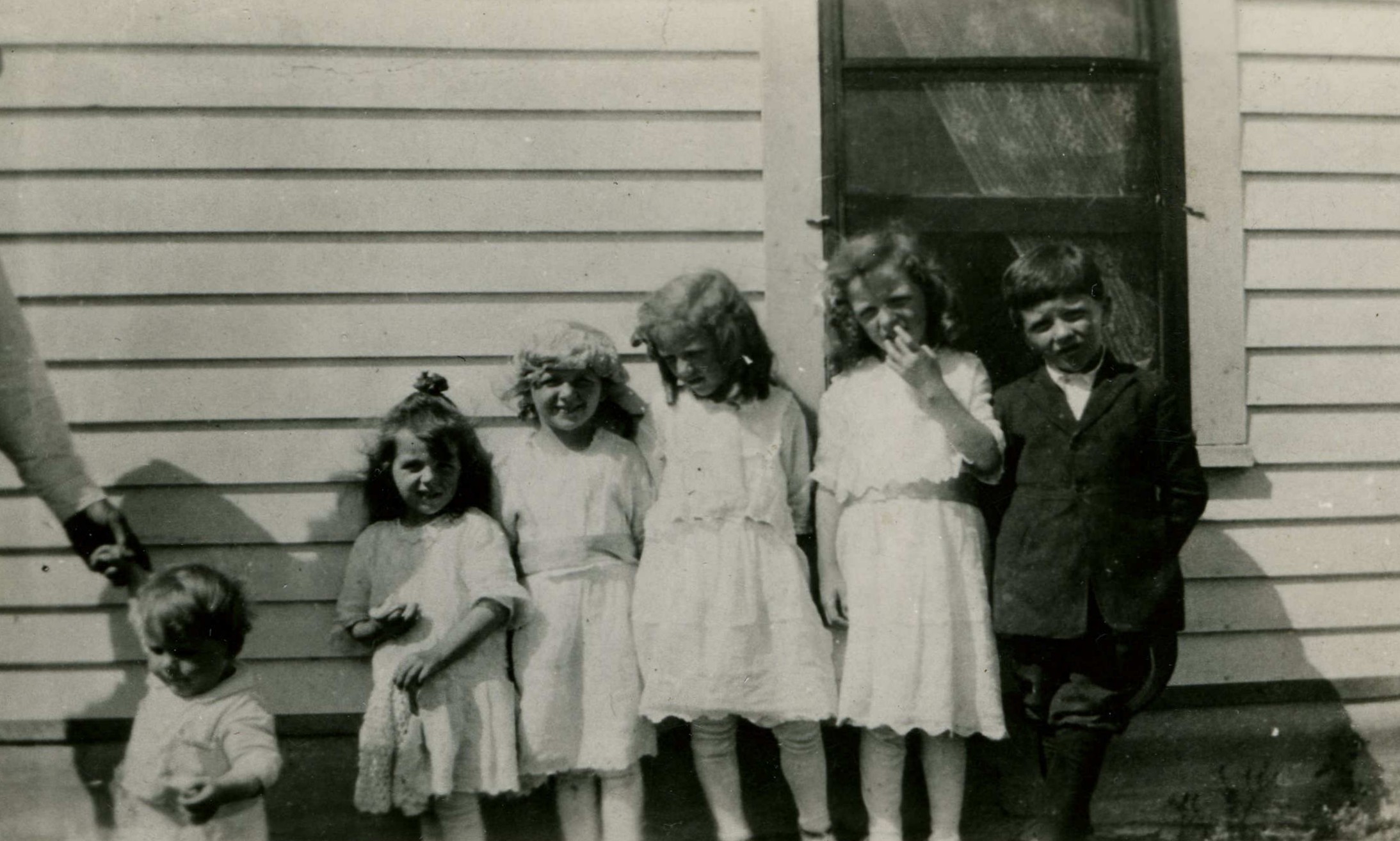
Their house on the farm would have had electricity and possibly a phone, but it did not have running water, indoor plumbing, or a furnace. Heat came from a wood-fired cook stove, and hot water came from a water reservoir inside the stove. If you wanted a bath you had to pump water, fill the reservoir, build a fire, and then carry the hot water from the stove to the tub. Sometimes it got so cold night during the winter that there was ice in the washbasin when they woke in the morning.
The toilet was an outhouse. Mom said they used an old copy of the Sears catalog for toilet paper - you tore out a page and crinkled it up a few times to make it softer. During a blizzard, getting to the outhouse, or to the barn to feed livestock was a dangerous journey. When snow threatened they ran a line from the back door so that you could make your way out and back, hand-over hand, even if it was snowing and blowing so hard that you couldn't see.
The elementary school was a one-room schoolhouse. Mom talked about riding a horse to school and back each day.
Mom's great love for her Dad came through in all of her stories about the farm. In addition to farming, Mom said that her dad had a part-time job maintaining a nearby road for the government. She talked about him leaving in the morning to work on the road with "only a crust of bread in his pocket" to eat for lunch. She described him as being very kind, which is especially notable because he was also a wrestler and a boxer.
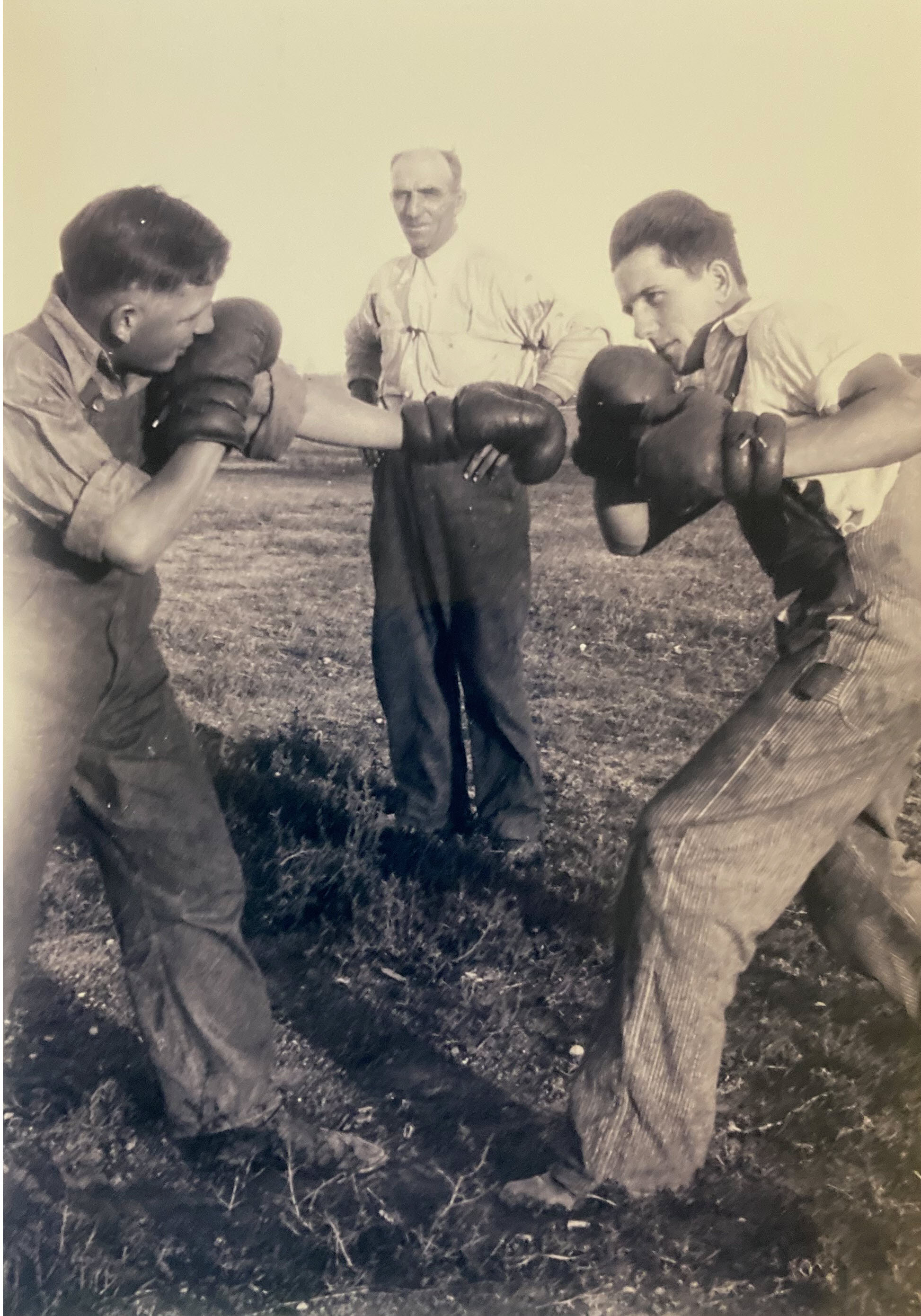
Andrew taught his son's, Andy and Hugh, to box. The sport wasn't a great fit for mild-mannered Hugh, but it seems that Andy got quite good at it. The picture below is from Elizabeth (McFadden) MacMillan's scrapbook, and she titled it, "Andy McFadden boxing in the town square, Crosby, North Dakota. Papa at bottom-left corner in Panama hat." In 2009 when Susan and I visited Mabel McFadden, Andy's widow, on her wall hung a flyer for another boxing match in Crosby, with Andy fighting in the main attraction and Hugh in an undercard.
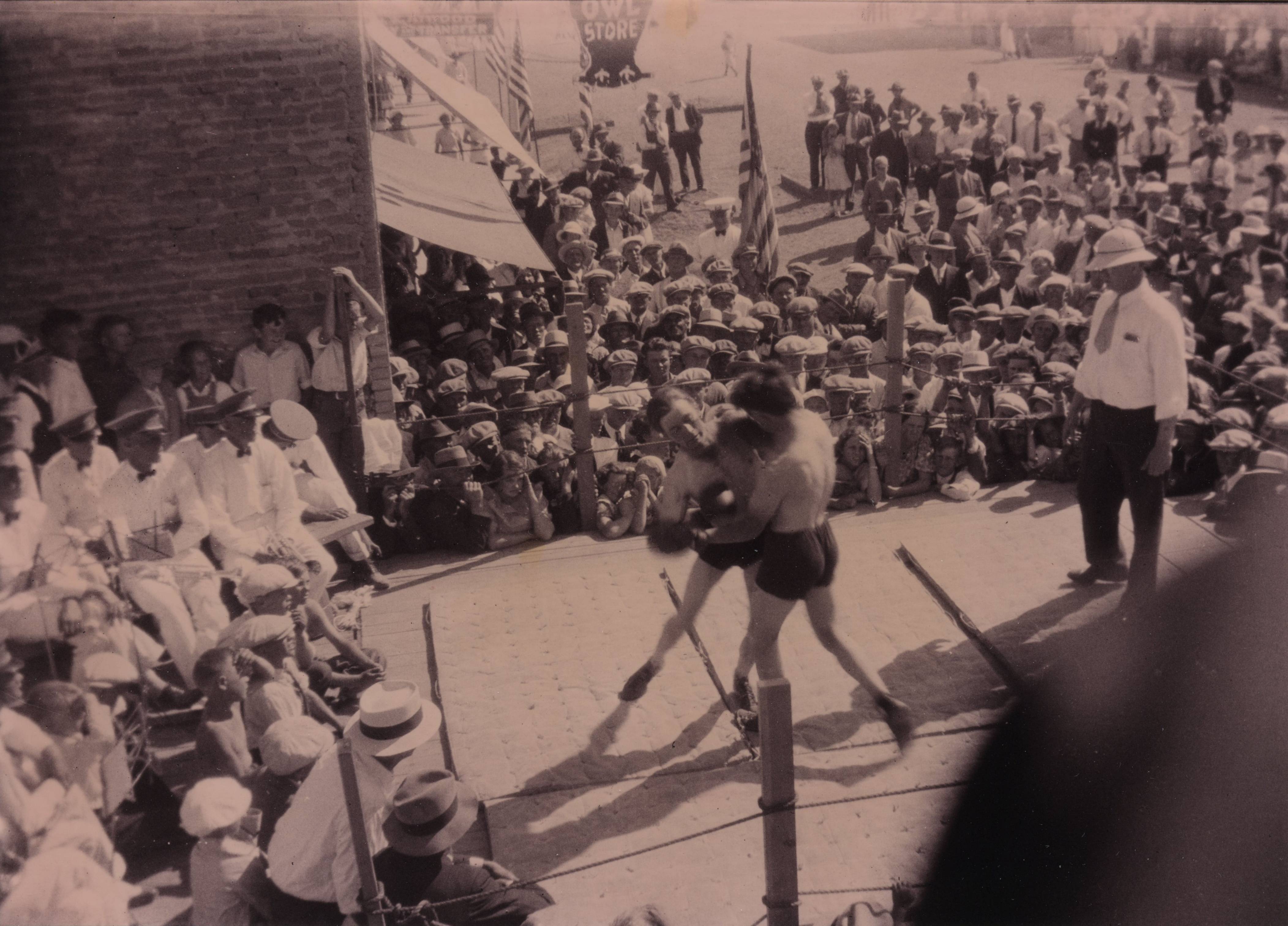
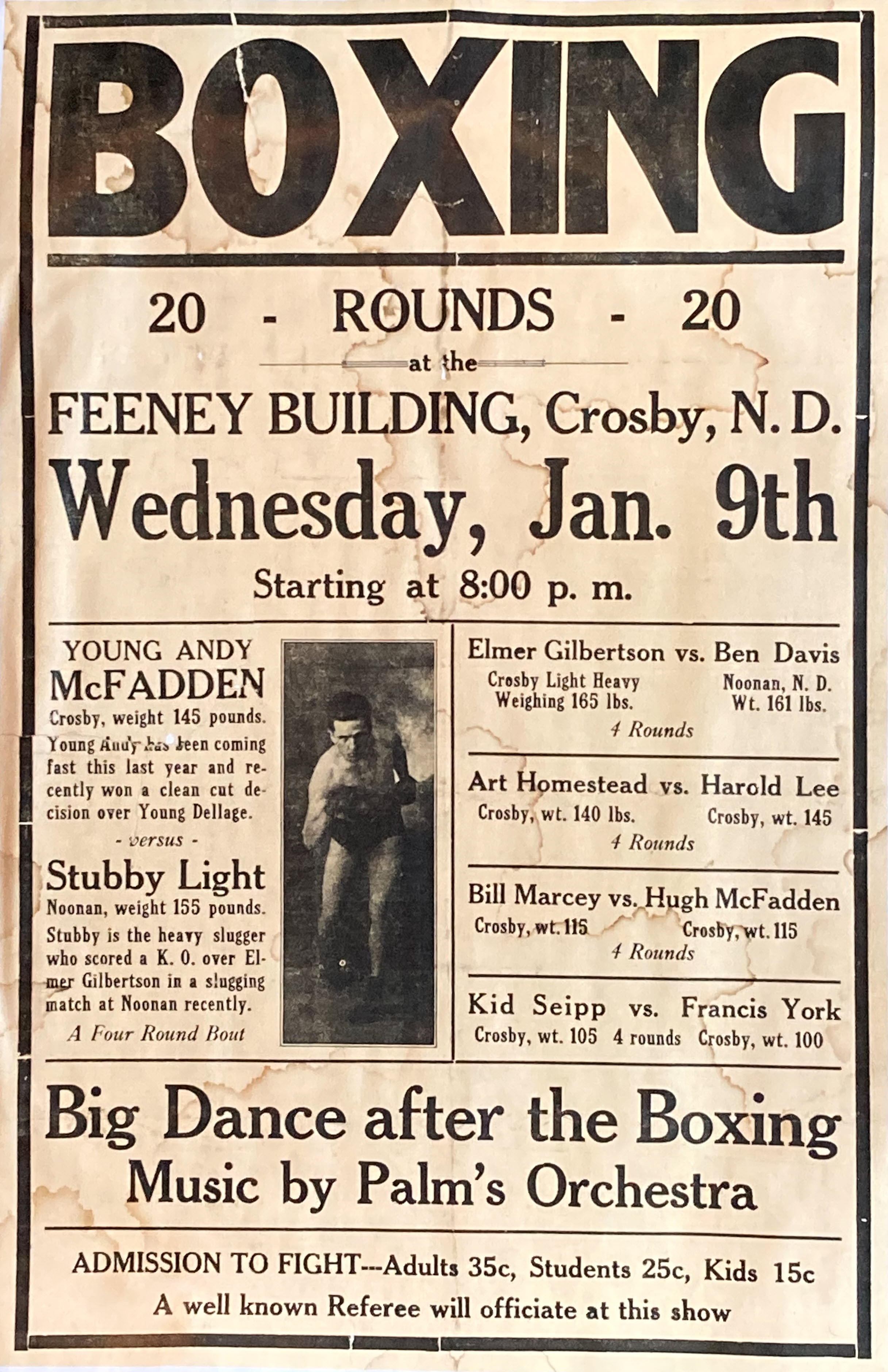
And the tradition was passed on one more generation. While at Kennewick High School in the late 1960's, Andy's son, Mike was the Washington State wrestling champion in his weight division, and younger son Marty wrestled as well.
When Mom was in high school her older brother Andy and older sisters Rosemary and Elizabeth left to find work or attend school elsewhere, so she dropped out of school for a year to help her Dad with the farm work. I remember her talking about harnessing the horses each morning before they went into the fields, and of working at a horse-drawn camp kitchen during harvest season for 25 cents per day. She said that when she returned to high school she always wore long sleeves so that the muscles in her arms wouldn't show.
The 1930's was the time of the Great Depression. As if that wasn't bad enough, there was also a four-year drought during which large portions of the Midwest where so dry they became known as the Dust Bowl. Crops wouldn't grow and thousands of small farmers were driven from their land. Mom talked about planting wheat only to see it spring up, wither, and die under the hot sun. After successive crop failures they were forced to pack what little they could into their Model A Ford and drive away from the land they loved so much.
Mom said that before they left they held an auction to sell their animals and tools. The farmers from the surrounding area came and offered what little they could spare for the things that were for sale, as much to provide the McFaddens with some money for the journey as to get something useful for themselves. It must have been a terrible time for Mom's parents. Having given their best years to fulfill the American immigrants' great dream of having their own farm, they had to gather their children, abandon all that their hard labor had earned, and set out for an uncertain future in the west.

This picture is of the McFaddens driving over the Rocky Mountains on their way west to the Yakima Valley in 1936. They're likely on the Going-to-the-Sun Road through Glacier National Park, which was completed in 1933. I remember Mom talking about being afraid that the mountains were going to fall down on them as they made their way through the Rockies. Having lived her whole life on the plains of North Dakota, she had never seen mountains before.
They are, left to right: Grandmother Ellen, Edith (always called "Honey"), Helen, Hugh, and Andy. My mother, Agnes and her father, Andrew must have been behind the camera. The two oldest sisters didn't make the drive west: Rosemary had already found work in the medical field (she became a nurse and served in the South Pacific during World War II), and Elizabeth had already found work in Minnesota (she worked for 3M building roads in Alaska during World War II).
Arriving in the Yakima Valley, they found work on the farms and in the fruit canneries. And so began their new lives in the west.
This picture of all of the McFaddens must have been taken in the early 1950s, as my grandfather, Andrew died on Good Friday of 1954, just before my mother, Agnes was going to tell him that I would be born that fall. Top row, left to right: Elizabeth, Honey, Hugh, Agnes, and Helen. Bottom row, left to right: Rosemary, Andrew, Ellen, Andy.
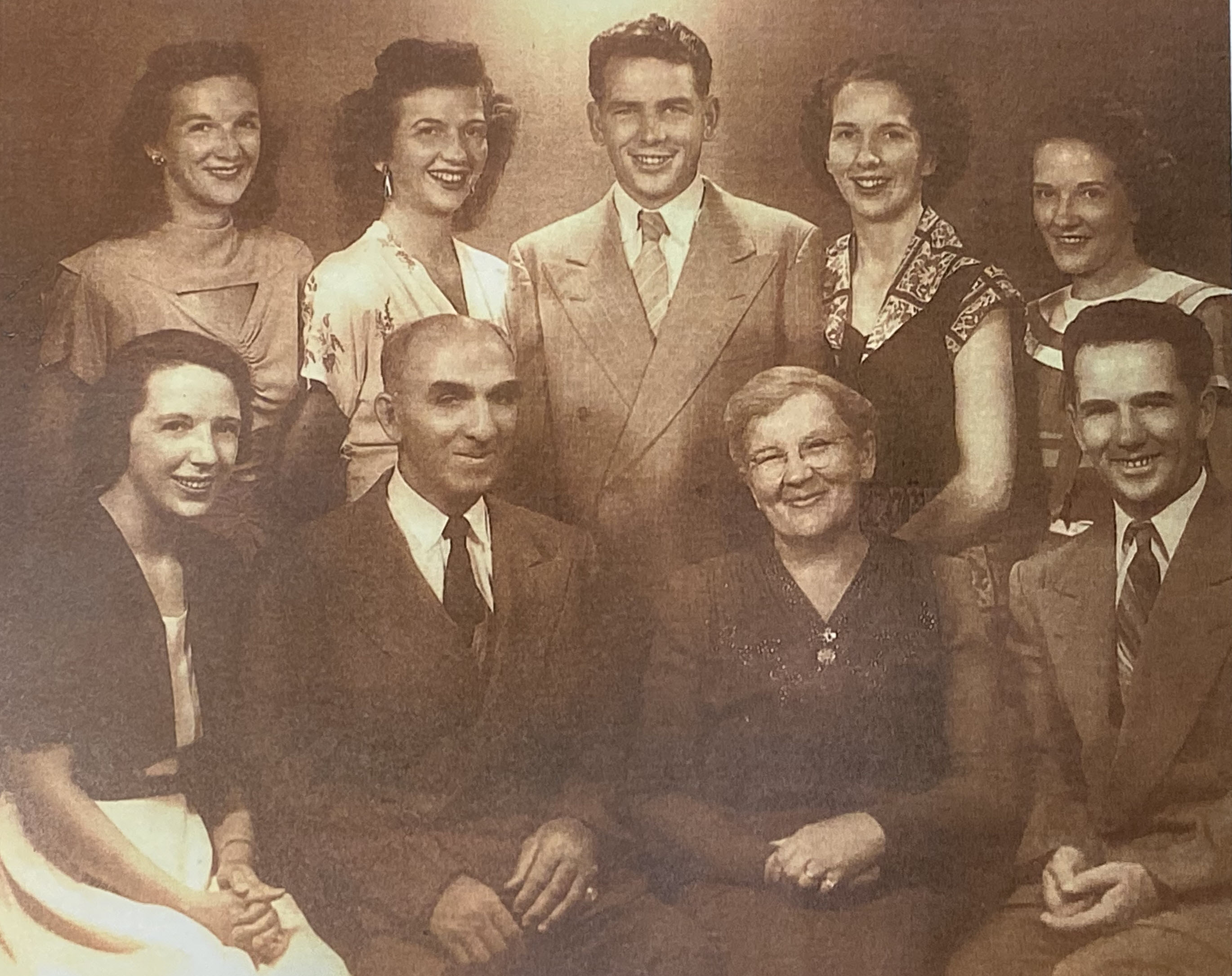
At this point all of the children have started new lives. Elizabeth would have just been married and moved to Washington DC, where her husband worked in the intelligence community. Honey moved to California. Hugh and Andy both found work as welders at Hanford, and lived close to one another in Kennewick. Agnes would have recently returned to Yakima with Bobby and Susan after a couple years in Peru, where Dad flew a float plane into the upper Amazon for Standard Oil. Helen was living in Yakima with children Frank and Eileen, having married Jimmy O'Hearn. Rosemary was working in Yakima as a nurse. She would later marry Dick Tompkins and spend the rest of her life in Oakland, California. Andrew would have retired from his final job during World War II, working in the Kaiser shipyards in Vancouver, Washington. My grandparents, Andrew and Ellen, spent their remaining years in Yakima and Kennewick, near most of their children.
In those days friends and family used the mail to keep in touch. The other common communications option, a long-distance phone call, was considered too expensive for anything short of emergency use. Elizabeth (McFadden) MacMillan hung on to many of the family letters, and shortly before she died she gave a number of them to my sister, Susan. The letter below was written in 1949 by Andrew McFadden to his daughter, Edith (AKA Edie or Honey) and her husband, Jack. It's great to see something written by my grandfather's own hand. Clearly, spelling was not his strong suit, but he was a farmer and a shipbuilder, not an English major.
Andrew mentions Thanksgiving dinner with my dad, Tommy and mother, Agnes. He says my older brother Bobby is at "the sisters school" (Saint Paul Elementary), while Helen's son, Frank is in school in Kennewick. Andrew's youngest son, Hugh and Helen's husband, Jimmy are working on the (new) Tacoma Narrows Bridge, the old one having famously collapsed during a severe windstorm in 1940. At that time Andrew was recovering from a hospital stay during which he had at least two operations and was near death. Andrew would bounce back and live another four years, dying in Yakima at Easter in 1954. My mother, Agnes was intending to tell him on that Easter Sunday that she was pregnant with me, but my grandpa never got that news.
